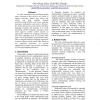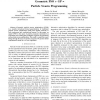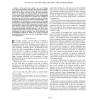DIGITEL
2008
IEEE
14 years 6 months ago
2008
IEEE
Most existing educational games cannot compete with their non-educational counterparts in terms of visual and narrative quality, gameplay, or adaptability. Amongst the most advanc...
DIGITEL
2008
IEEE
14 years 6 months ago
2008
IEEE
Being able to express oneself musically and experiment with music composition is traditionally determined by one’s ability to play an actual instrument with a certain degree of ...
DIGITEL
2008
IEEE
14 years 6 months ago
2008
IEEE
As robot technologies have developed rapidly, many researchers have tried to use robots to support education. Studies have shown that robots can help students develop problem-solv...
DIGITEL
2008
IEEE
14 years 6 months ago
2008
IEEE
The educational gaming field is rapidly growing both in acceptance and variety. Within this variety, the technological evolution of wireless/handheld (W/H) computing devices is op...
DIGITEL
2008
IEEE
14 years 6 months ago
2008
IEEE
We present progress with roBlocks, a reconfigurable modular robotic system for education. Children snap together small, magnetic, heterogeneous modules to create larger, more comp...
CEC
2008
IEEE
14 years 6 months ago
2008
IEEE
— This work is part of a project that aims to develop and operate integrated evolvable hardware systems using unconstrained evolution. Experiments are carried out on an evolvable...
CEC
2008
IEEE
14 years 6 months ago
2008
IEEE
CEC
2008
IEEE
14 years 6 months ago
2008
IEEE
—Geometric particle swarm optimization (GPSO) is a recently introduced formal generalization of traditional particle swarm optimization (PSO) that applies naturally to both conti...
CEC
2008
IEEE
14 years 6 months ago
2008
IEEE
— In the early days a policy was a set of simple rules with a clear intuitive motivation that could be formalised to good effect. However the world is now much more complex. Subt...
CEC
2008
IEEE
14 years 6 months ago
2008
IEEE
— Pseudo-random number generators (PRNG) have been intensively used in many stochastic algorithms in artificial intelligence, computer graphics and other scientific computing. ...



